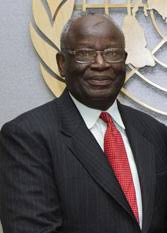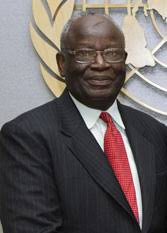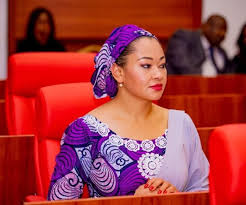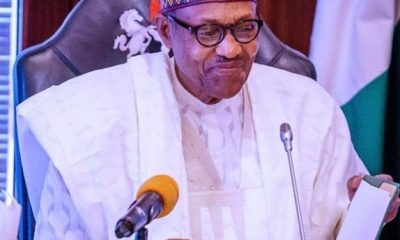Opinion
Gambari and Nigerians’ ‘skepticism’

Professor Ibrahim Gambari is not a strange personality in Nigeria’s political scene. He is a ‘stand out’ academician; erudite scholar; a diplomat and a man of many colours. Born in Kwara State in 1951, he is a Fulani by descent.
When President Muhammadu Buhari announced him as the new Chief of Staff after the death of Mallam Abba Kyari on 21st March, 2020 as a result of coronavirus ailment, Professor Gambari’s emergence was a different thing to different people. Those familiar with his past have perspectives of the things to come within the Presidential villa. Those who have faint understanding of his past welcome his emergence with skepticism.Those who don’t know him at all celebrated and wished him well. They even commended President Muhammadu Buhari for not picking his Chief of Staff from the far north after the demise of one of the most powerful Chief of Staff ever and the Head of cabal in the Villa, the late Mallam Abba Kyari.

Hours after late Kyari’s burial, the social media became awash with insinuation of those likely to succeed Kyari as the new Chief of Staff with so many names of personalities being peddled. The insinuation was such that the social media enthusiasts would guess names of politicians or beaurocrats as likely to succeed Kyari as the Chief of Staff. Purveyors have even gone far in tasking the rumoured Chief of Staff on what to do and those things that shouldn’t happen with a reminder of the “misdeeds of late Kyari.” But the choice of Buhari’s pick on Wednesday was a far cry as Professor Gambari was never envisaged as Kyari’s successor.
His announcement was not a challenge to analysts who are well acquainted with his past before they began to dig deep into the archives to let Nigerians know that tough times await those waiting to patronize the Villa.
First, it started with when he was the Minister of the then External Affairs; that Ibrahim Gambari loomed large to the extent that he stoutly defended anarchy, dictatorship and parochialism of Late Sani Abacha at the United Nations. He defended the killing of Mr Ken Saro-Wiwa, a Niger Delta Environmental activist and others in what later became the “Ogoni nine.” Analysts posited that the now Chief of Staff defended late Sani Abacha in his capacity as a diplomat intelligently to an extent that his record remain unbeatable till this day. He said to be an agent provocateur by those conversant with the inner circle of the late dictator and he did that happily. Reactions that trailed the revelation were more of skeptics than antics with the impression that the new Chief of Staff is a dangerous man or something close to being a dangerous element who is poised to occupy a strategic office.
In as much as juxtaposing the past with the present is not out of place, after all, “old habits they said, die hard”, the phenomenon is precipitated by what they have seen; heard and experienced in the late Kyari, hence, they didn’t want to take chances this time around, unfortunately, the office of the Chief of Staff is by appointment and not elective that affords the people to exercise their franchise in the choice of who occupies the office and for the next three years Gambari would be in that office, ‘ceteris pari bus.’
Whether the scepticism or cynicism is anything to go by or not, what features prominently here is that the psychology of the master/servant relationship differs as well as it varies from country to country. This is despite the rules that guides that particular office and in this context who is President Muhammadu Buhari? A look at Buhari through the late Kyari in how the office of the Chief of Staff conducted the affairs of the President’s office suffices. Like Kyari, like Ibrahim Gambari. Whereas, late Kyari was a lawyer by training and also practised journalism, his successor is a man of learning a professor; a diplomat and as President Buhari though not sound academically like his Aides would tend to rely heavily on his Chief of Staff.
Late Abba Kyari was not only powerful, but he was an octogenarian with authority. Formally and informally, Buhari related and relied heavily on him. His office was next to no office apart from Buhari’s office. He wielded powers to an extent that he could interlope into the office of the Vice President and usurp the Vice President’s responsibility and in what was considered as ‘ultra vires’ was not Abba Kyari’s concern. Of his official responsibilities and Mr. President’s family responsibilities, Kyari was the rallying point, a development that irked the President’s wife who shouted for help. Severally, Aisha Buhari had accused the late Kyari of being responsible for Mr. President’s failure. She did accuse him of tearing her family apart.
This piece remind us of how he headed cabals in the presidency with all politicians looking for political appointments looking out for him. That was the former Chief of Staff. – the All powerful Abba Kyari. The haywire politics was centred in that office and if anyone, a stranger to that office looking for political appointment, he is over 2,000 below the sea level in what he is looking for.
Notwithstanding, a Chief of Staff is a domestic staff of his principal. He is an appointee of his appointor who coordinates activities of the office of his principal. According to Wikipedia.org, the Chief of Staff to the President is the senior operational member of the office of the President of Nigeria. The Chief of Staff is the principal channel of appointer. This is the reason Buhari’s Chief of Staff wields so much powers. Be that as it may, things are expected to be galvanised in favour of the people of Nigeria and not for a few privileged cabals. With the fears of Nigerians, would the new Chief of Staff do things differently to prove critics wrong? Time will tell.
Samson Atekojo Usman writes from Abuja























